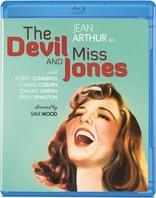The Devil and Miss Jones Blu-ray Movie
HomeThe Devil and Miss Jones Blu-ray Movie 
Olive Films | 1941 | 92 min | Not rated | Mar 26, 2013Movie rating
7.3 | / 10 |
Blu-ray rating
| Users | 0.0 | |
| Reviewer | 3.5 | |
| Overall | 3.5 |
Overview
The Devil and Miss Jones (1941)
Department store owner J.P. Merrick finds that several of his employees are unionizing to get more money and better working conditions. In order to find out who the organizers are, he gets a job at the store as a shoe salesman. Not realizing his true identity, he's befriended by Mary Jones and Joe O'Brien, the two ringleaders, and Elizabeth Ellis, a charming older woman with whom he develops a romance.
Starring: Jean Arthur, Robert Cummings, Charles Coburn (I), Edmund Gwenn, Spring ByingtonDirector: Sam Wood (I)
| Romance | Uncertain |
| Comedy | Uncertain |
Specifications
Video
Video codec: MPEG-4 AVC
Video resolution: 1080p
Aspect ratio: 1.37:1
Original aspect ratio: 1.37:1
Audio
English: DTS-HD Master Audio Mono
Subtitles
None
Discs
25GB Blu-ray Disc
Single disc (1 BD)
Playback
Region A (C untested)
Review
Rating summary
| Movie | 3.5 | |
| Video | 3.0 | |
| Audio | 3.0 | |
| Extras | 0.0 | |
| Overall | 3.5 |
The Devil and Miss Jones Blu-ray Movie Review
Undercover Boss, 1941 edition.
Reviewed by Jeffrey Kauffman April 1, 2013At this point in what is hopefully its ever shortening shelf life, does anyone really believe that the employees are clueless when a bearded stranger shows up on Undercover Boss followed by a film crew? The unlikely hit series is of course built around the conceit that the “big boss” knows next to nothing about the grunt workers under his (or her) command, and that if only he or she would get down in the dirt with the underlings, everything would be so much better. (This series just made front page news in my hometown of Portland, Oregon, when one of its recent "bosses" turned out to be a former Portlander who according to the news stories had done time in a federal prison camp for some of his questionable business practices here.) It’s of course an incredibly appealing premise, at least to the proletariat who more often than not feels like they’re slaving away with little or no recognition, often under admittedly less than ideal conditions. And that’s pretty much exactly the premise of 1941’s The Devil and Miss Jones, a charming film penned by Norman Krasna and directed by Sam Wood that has more than a bit of Frank Capra’s aesthetic infusing it. (The film should of course not be confused with the legendary 1973 porn outing The Devil in Miss Jones, which only goes to prove how important changing a conjunction to a preposition can be.) Anyone who has watched even one episode of Undercover Boss will instantly recognize the setup to The Devil and Miss Jones. Charles Coburn plays reclusive gazillionaire J.P. Merrick whose many holdings include midtown Manhattan department store Neely’s, which has just made front page news when a gaggle of its employees hung an effigy of Merrick (who hasn’t been seen in public for decades) to protest working conditions. Initially Merrick’s own gaggle of simpering yes men tell him that a detective has been hired to look into who the rabble rousers are, but after meeting with the private dick, Merrick gets the bright idea to infiltrate the store himself to find out what’s going on.
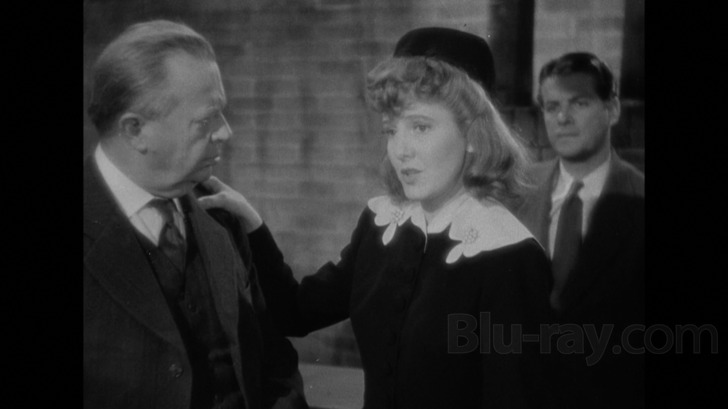
We live in an increasingly peripatetic, even transient, society, and so one of The Devil and Miss Jones’ central conceits—that some people at least try to spend their entire lives working for one company, often with little to show for it—may seem hopelessly out of date and hard to relate to. But balancing that temporal scale may be the fact that even as contemporary workers tend to change employers every few years, they share similar feelings of not being valued, perhaps one reason why they do change jobs so frequently. The disastrous American economy of the past several years has also made people thankful for any job they might have, and one would think that should have been the case as well in 1941, as the United States was still pulling itself out of the doldrums of the Depression and didn’t yet have the economic shot in the arm that the industrial and manufacturing elements of our entry into World War II provided.
The “disposable employee” aspect of The Devil and Miss Jones may hit closer to home than it may have in 1941, however. The film makes the somewhat prescient point that even those with the best of intentions of staying with their employer for life may find themselves booted out the door when younger, cheaper employees come along. Have you ever wondered why so many local television news reporters tend to look like they’re right out of college? It’s because they are! My wife, who spent many years in broadcast journalism, experienced this on a personal level. Though she was never let go from any of her news positions (perhaps because she was in her twenties and thirties when she pursued this career), she saw older, more experienced reporters and anchors repeatedly shown the door simply due to their salary demands. Why keep a “moldy oldie” on board when a fresh young thing is willing to step in for half the pay?
When Merrick decides to investigate the rabble rousing at Neeley’s Department Store, he meets a gaggle of people from all walks of life, an ironic situation considering the fact that he’s assigned to the shoe department. He quickly meets salesgirl Mary Jones (Jean Arthur), who in turn introduces him to elderly saleswoman Elizabeth Ellis (Spring Byington) as well as the unctuous floor manager Hooper (Edmund Gwenn). Merrick takes a shine to Elizabeth, accompanying her to lunch, but just as quickly develops an aversion to the rule spouting Hooper. That night, Mary drags Merrick to a surreptitious employees’ meeting, where she introduces Merrick to her erstwhile boyfriend, Joe O’Brien (Robert Cummings), who of course turns out to be the leader of the quasi-unionizing forces, and who has in fact just been fired from Neeley’s.
There’s nothing actually overtly “union”-ist about The Devil and Miss Jones, at least not formally. Instead, these workers are demanding nothing more than a recognition that if they devote so much of their lives to a company, they at least deserve job security. While there are calls to strike running just beneath the surface of the film, this really isn’t as much a management versus worker scenario as it one of a fish out of water, as Merrick attempts to blend in with the middle class.
There’s an unabashedly sentimental side to Krasna’s screenplay, which one must assume was done with a certain arch self awareness. When Mary calls Merrick up in front of the employees at the after hours get together and tearfully holds him up as an example of an elderly worker done wrong by a series of employers, she spouts some high-falutin’ flowery language that in fact could have easily been lifted from any given Frank Capra outing. But here it’s played simultaneously for laughs and for pathos. She’s being unabashedly silly in her own way, something that is only exacerbated by the fact the audience knows she’s making a complete fool out of herself and that Merrick is both angry and embarrassed to be there.
The film is full of great little character bits, and includes one of Charles Coburn’s most winning performances (he was Oscar nominated, and would in fact win a couple of years later for another Arthur film, The More the Merrier). Cummings is kind of bland and has virtually no chemistry with Arthur, but both Arthur and the lovely Spring Byington are great, full of charm and low key vigor. Edmund Gwenn is despicably amusing as the uptight floor manager, the sort of character who would have probably banished Gwenn’s Santa Claus from Miracle on 34th Street from the store for not wearing appropriate business attire.
The Devil and Miss Jones Blu-ray Movie, Video Quality 
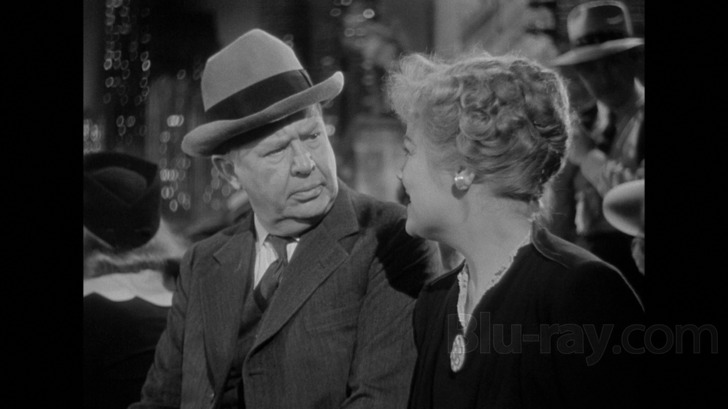
The Devil and Miss Jones is presented on Blu-ray courtesy of Olive Films with an AVC encoded 1080p transfer in 1.37:1. The elements here have their fair share of blemishes, mostly limited to minor scratches and the occasional flecks of either black or white that show up from time to time. The overall look of this transfer is rather soft at times, however, only heightened by what appears to be regular soft focus lenses utilized for many of Arthur's close-ups. Those issues aside, the bulk of this transfer looks rather good, with decent (though occasionally fluctuating) contrast, and well modulated gray scale.
The Devil and Miss Jones Blu-ray Movie, Audio Quality 
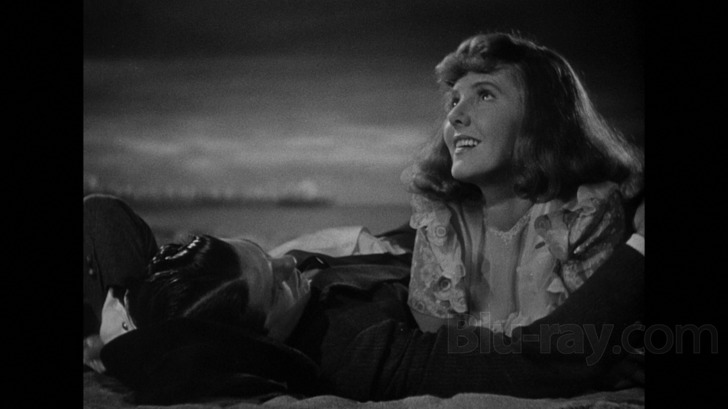
The Devil and Miss Jones features a lossless DTS-HD Master Audio Mono mix that offers reasonable fidelity given appropriate expectations. There's noticeable albeit pretty minor hiss throughout this presentation, but dialogue remains mostly clear (I had a—excuse me—devil of a time understanding S.Z. Sakall as Merrick's butler, but that was due to Sakall's thick Hungarian accent). The mix is well prioritized, though there's really not much here other than dialogue and the occasional foley effect, as when the group journeys to the beach to frolic one day.
The Devil and Miss Jones Blu-ray Movie, Special Features and Extras 
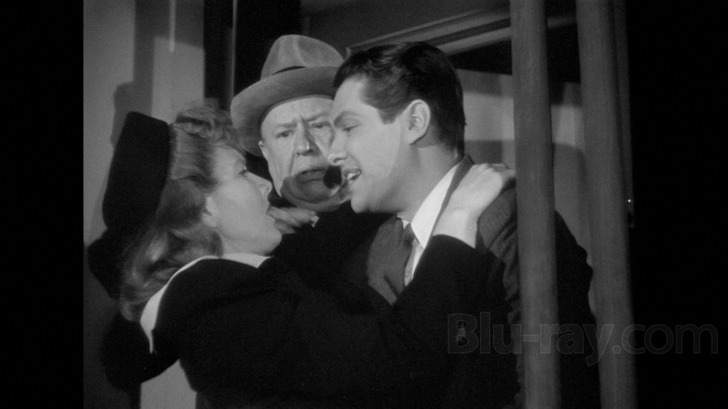
No supplements are offered on this Blu-ray disc.
The Devil and Miss Jones Blu-ray Movie, Overall Score and Recommendation 
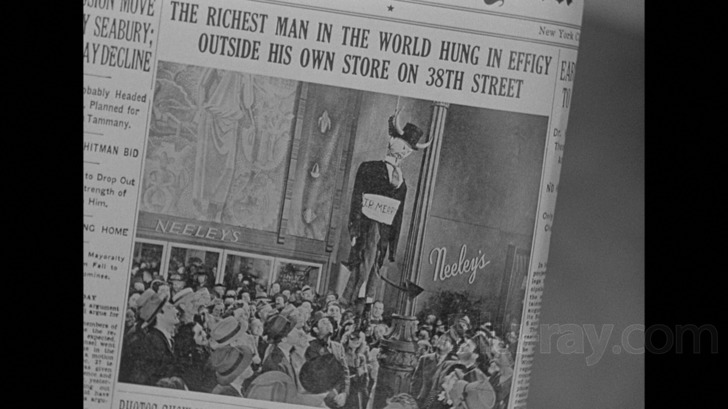
The Devil and Miss Jones is a charming and effortless comedy that has its heart in the right place. It's more gently amusing than laugh out loud hysterical, but it rather nicely raises some pertinent questions about what responsibilities employers have to their employees, and how exactly employees should go about getting their due. Coburn is wonderful as the harried tycoon who finds his worldview upended once he gets down and dirty with the hoi polloi, and Arthur and Byington are both extremely charming in their roles. Cummings is kind of a lackluster presence, and a decidedly odd choice to play a rabble rouser (he seems rather mild mannered most of the time), but otherwise this is a solid early forties' entry that makes an interesting parallel piece to some of Frank Capra's better known social statements. This Blu-ray has generally pleasing video and audio and comes Recommended.
Similar titles
Similar titles you might also like

Midnight
1939

The Rewrite
2014

Baby Boom
1987

Beauty & the Briefcase
2010

Overboard
2018

Gun Shy
2000

Blindfold
1965

Hello, My Name is Doris
2015

The Devil Wears Prada
10th Anniversary Edition
2006

Easy Living
1937

Mr. Blandings Builds His Dream House
Warner Archive Collection
1948

The Best Exotic Marigold Hotel
2011

The Palm Beach Story
1942

Miss Congeniality
2000

No Time for Love
1943

A Stranger Among Us
1992

Legally Blonde 2: Red, White & Blonde
2003

Stand-In
1937

The Good Fairy
1935

Gentlemen Prefer Blondes
1953
